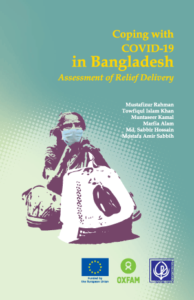 The COVID-19 pandemic has accentuated the pre-existing vulnerabilities of the marginalised group in Bangladesh. It has also caused new people to join the values of traditionally marginalised groups. All these people are in dire need of public policy support to cope with the adverse impacts of the pandemic. In many ways, the pandemic has disrupted the pursuit of Bangladesh’s medium-term development agenda, including the Sustainable Development Goals (SDGs) and the Eighth Five Year Plan. To what extent the country will be able to successfully regain the lost momentum will hinge on its ability to extend the necessary support to the pandemic-affected people. It is the general practice of the Government of Bangladesh (GoB) to extend relief support as disaster response measures; the response to the COVID-19 pandemic has been no exception. The GoB has implemented several relief support programmes, both in cash and in-kind types, targeted towards the marginalised sections of the population. The local authorities involving local administration and concerned elected bodies were entasked to deliver these relief programmes at the local level.
The COVID-19 pandemic has accentuated the pre-existing vulnerabilities of the marginalised group in Bangladesh. It has also caused new people to join the values of traditionally marginalised groups. All these people are in dire need of public policy support to cope with the adverse impacts of the pandemic. In many ways, the pandemic has disrupted the pursuit of Bangladesh’s medium-term development agenda, including the Sustainable Development Goals (SDGs) and the Eighth Five Year Plan. To what extent the country will be able to successfully regain the lost momentum will hinge on its ability to extend the necessary support to the pandemic-affected people. It is the general practice of the Government of Bangladesh (GoB) to extend relief support as disaster response measures; the response to the COVID-19 pandemic has been no exception. The GoB has implemented several relief support programmes, both in cash and in-kind types, targeted towards the marginalised sections of the population. The local authorities involving local administration and concerned elected bodies were entasked to deliver these relief programmes at the local level.
Authors: Mustafizur Rahman, Towfiqul Islam Khan, Muntaseer Kamal, Marfia Alam, Md. Sabbir Hossain and Mostafa Amir Sabbih
Publication period: June 2021


